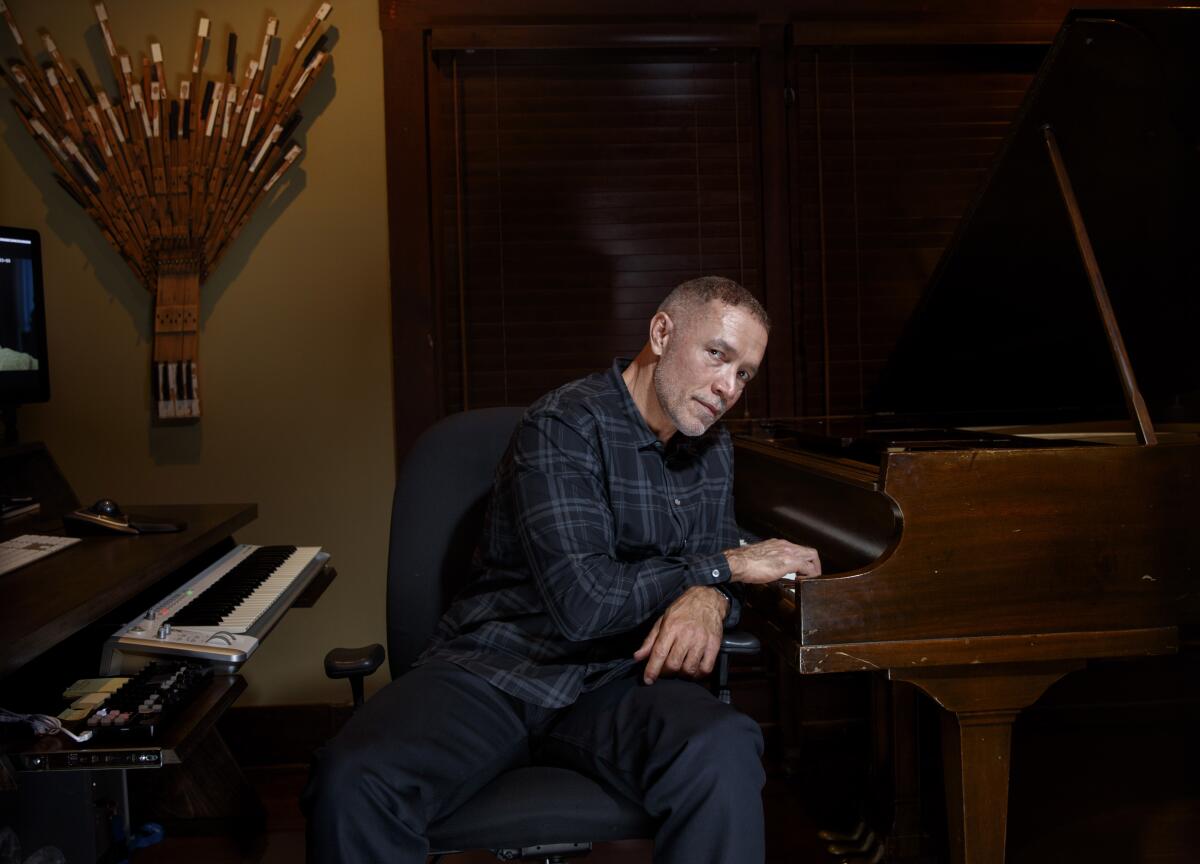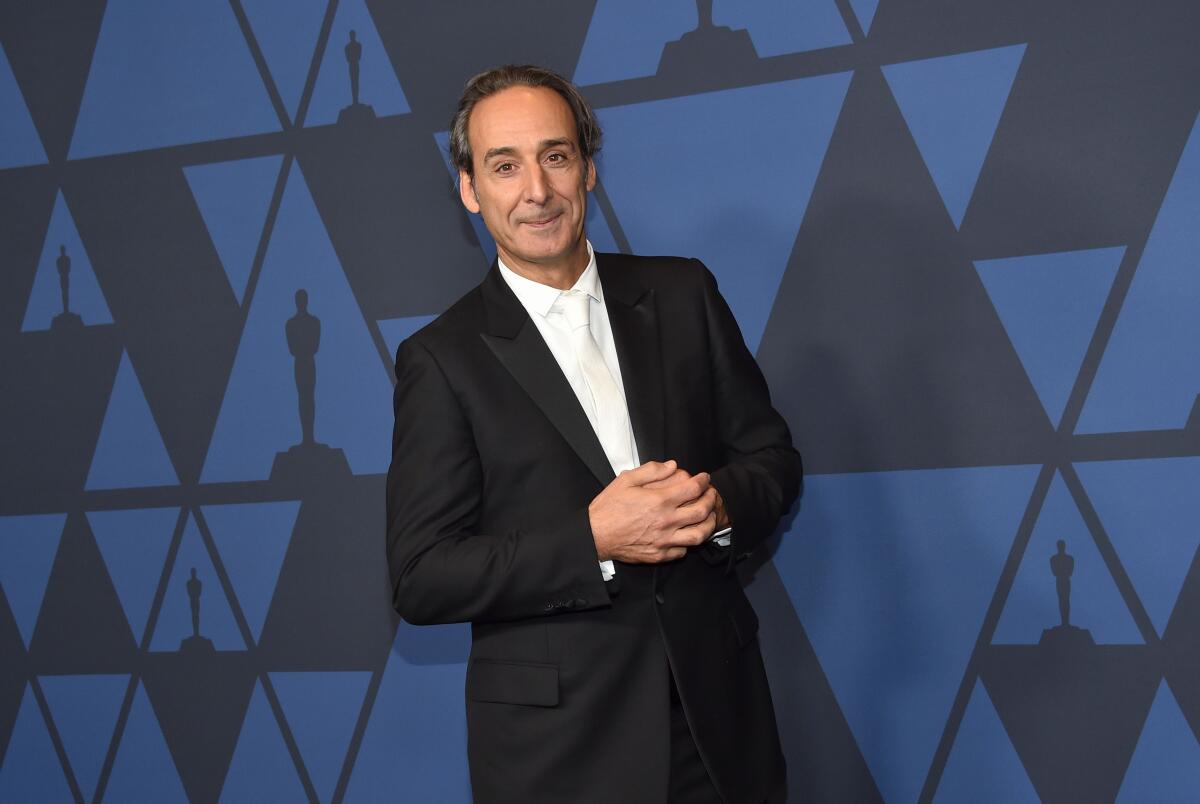Film composers turn from the expected this season to find a unique sonic wavelength

- Share via
Conservative, conventional choices are nowhere to be found in the noteworthy scores of 2019. If anything binds the collection that follows, it’s directors who were willing to take a wild chance or a road less traveled and composers who were up for the adventure. Certainly, a “Twilight Zone”-esque story about evil doppelgängers and a brash New York movie about a Jewish jeweler addicted to gambling don’t fall into any neat musical categories. But even the staid genre of “period dramas” got a shakeup this year, with composers defiantly going against type.
As “The King” composer Nicholas Britell put it: “Every project is its own unique world and should be its own unique world.” He believes the film composer’s job is “finding a wavelength that feels like it’s somehow connected to the movie but having its own approach, or its own perspective.”
Here are four composers and the scores worth appreciating this season.
Michael Abels
“Us”
Michael Abels announced himself to the filmgoing world in 2017 with his creepy “gospel horror” score for “Get Out.” Jordan Peele’s next film, “Us,” follows a young family that’s being followed by a young family: their terrifying, animalistic doppelgängers.
“The overall mandate for us was that the score really needed to scare the pants off of people,” Abels said.
After a chilling prologue set in a hall of mirrors, Abels kicks off the film with a jumpy choral “anthem” being chanted over the image of rows and rows of caged rabbits. The opening titles of “Get Out” similarly played to a freaky chant in Swahili that was loaded with meaning — but here the faux-Latin words mean ... nothing.
“The anthem really represents the spirit of the Tethered and the uprising that they’re about to stage,” the composer explained, referring to the film’s underground-dwelling lookalikes. “So the feeling from that piece is: There’s a group of people, and they’re organized, and they’re angry. But it’s a nonsense language — I made up the syllables.”
Abels ran with the film’s duality metaphor, “experimenting with instruments that you wouldn’t hear together — a very traditional instrument and a very non-western instrument, for example,” he explained. “Or extreme ranges, or anything that had a sense of opposite to it.”
For instance, a violin represents Zora while the rarely heard cimbalom — a hammered dulcimer instrument from Eastern Europe — represents Umbrae (both played by Shahadi Wright Joseph). Abels also used Japanese taiko drums, in the spirit of “trying to bring different, unexpected aspects of the world into the score.”
A standout moment in the film, the violent dance between Lupita Nyong’o’s two characters, was set to Abels’ new string arrangement of “I Got 5 on It” by Luniz. He also wrote a deliberately cheesy score for the fake Hands Across America video seen in the movie.
“The film is really about individual characters confronting their own mirror images,” Abels said. “It’s a very intimate, personal story, so the score needed to feel like it was right with you and not about invaders from another universe.”
Peele said he’s always looking for a score that will marry the familiar with the never-before-heard, which is one of his composer’s unique gifts. “If you describe a new sound,” Peele said, “he can go away and bring that to you — which is just really remarkable.”
Nicholas Britell
“The King”
Nicholas Britell, the Oscar-nominated composer of “Moonlight” and “If Beale Street Could Talk,” recently won an Emmy for his bop of a theme for “Succession.” The HBO series, about a wealthy, dysfunctional family, is scored with a mash-up of ironically elegant classical music and hip-hop beats.
“The King,” Netflix’s new film about Henry V starring Timothée Chalamet, is also about a wealthy, dysfunctional family — but the two projects otherwise couldn’t be more different.
“What’s the Tolstoy ‘Anna Karenina’ quote? ‘All happy families are alike; each unhappy family is unhappy in its own way.’ Perhaps every family like this has its own complex challenges,” Britell said with a laugh.
And each yields its own unique musical expression. Britell watched David Michôd’s moody take on the Shakespearean epic, set in the 1400s, and had a weird thought: “What if this was the 25th century? What would that sound like?”
“The 1400s is so far away from today,” he said. “That world is a completely foreign world to us. And I think sometimes we inherit certain ideas of what that feels like, or looks like, or sounds like. David was very excited to explore a musical language that didn’t overtly feel ‘period.’”
To accomplish that, Britell created “alien” sounds with traditional and nontraditional instruments. He used bass clarinets playing above their range, run through tape filters and distorted to create an almost human-like voice. He also musicalized the sound of clanging metal and mingled analog synthesizers with his orchestra — which, at times, is complemented by a boys choir.
As with many of Britell’s scores, the musical language of “The King” is minimalistic — cyclical, repeating chord patterns that churn and hypnotize. He wrote a theme for the relationship between Hal (Chalamet) and Falstaff (Joel Edgerton), which he saw as the heart of the film; a swirling theme for Hal “feeling like he’s being swept into potentially the wrong direction”; and a third theme for Hal “trying to figure out how to be a king.”
It’s arguably the composer’s most somber score yet, a dirge for the abuse of power and the awfulness of war. The modern vocabulary in the music helped the film feel even more urgent and its themes more resonant.
“Whenever a movie feels more complex in a way, or where it feels like I have to think or explore the ideas and the emotions in multiple ways,” Britell said, “I’m always more drawn into that.”
Daniel Lopatin
“Uncut Gems”
Under his stage name Oneohtrix Point Never, Daniel Lopatin electrified the Safdie brothers’ 2017 film, “Good Time,” with grungy, gridded electronica. They re-teamed for “Uncut Gems,” starring Adam Sandler as Howard Ratner, a New York jeweler addicted to the high-stakes stress of “winning”: betting on basketball, turning a profit on gems or rubbing shoulders with celebrities.
Directors Josh and Benny Safdie have a love for sooty ’70s and ’80s cinema like “The King of New York,” and that love infuses every inch of their own movies — including the music.
“They expect the score to always have a fantastical quality to it,” Lopatin noted. “But they also expect the film to have a very realistic quality to it. And in that contrast, you pretty much understand our collaboration.”
Vangelis, the Greek synthesizer king, was a major inspiration on the “Uncut Gems” score — which features shimmering analog synths, big cosmic chords, pulsing flutes and a cult-like choir chanting “Bling.” (“Howie Bling” is the Safdies’ nickname for Sandler’s character.)
The film is a visceral panic attack, stressing the viewer out with loud, overlapping dialogue and a restless camera as Howard’s poor decisions come around to suffocate him. The score contributes to that feeling of anxiety by moving to its own wild, New Age rhythm.
Lopatin performed all of the synths — from his dad’s old Roland Juno-60 to a brand new polyphonic Moog — and his setup took a cue from Vangelis’ old Nemo Studios in that it allowed him to express musical ideas in one continuous take. Mario Castro performed all of the saxophone solos and interpreted the composer’s Mellotron flute imaginings for real flute.
Lopatin’s big concept for the score was seeing Howard as the black opal — a rare rock he acquires from Ethiopia that’s full of rainbow-colored gems — at the nexus of the story.
“There’s this kind of inside/outside interplay in the film between Ratner’s material reality and the interior realm that he doesn’t have total access to, but is kind of vaguely aware of — that spiritual realm that he’s connected to through the opal,” Lopatin explained.
“The outside is the city. The outside is the hustle. It’s the melodicism. It’s the density of sound. It’s the freneticism of the arrangements. And the inside is — if you blow all of that away, what is left? Is there still a Howard Ratner in that world?”

Alexandre Desplat
“Little Women”
There have been multiple film adaptations of Louisa May Alcott’s “Little Women,” and the tendency for composers is to play up the romance, the nostalgia and the yuletide atmosphere of 19th century New England.
Some of those flavors are found in the score for Greta Gerwig’s new take on the story, which stars Saoirse Ronan as Jo March, but from the first frame something is clear: This is not a pastoral score, but an almost frenzied one.
Alexandre Desplat, the Oscar-winning composer of “The Grand Budapest Hotel,” was simply responding to Gerwig’s wild, nonlinear structure.
“The movie is so intelligently, ingeniously built — like a puzzle,” he said. “It’s always surprising. You’re in childhood, adolescence — it’s the present, the past. If I would start doing long, calm notes, it would kill it. I realized that the music is the score of a ballet. The score is just dancing with them all the time.”
Desplat’s music bounces with rapid string runs and breathless energy, and he often uses the orchestra like a percussion instrument: pizzicato violins, staccato woodwinds and plucked harp.
“It’s not a quiet river,” he said. “It’s the river of youth, where everything is bubbling, where everything is excitement.”
Most notable are the score’s two pianos and the sound of four hands sprinting and leaping along the keys. He got that idea from the French title of the book: “Les Quatre Filles du Docteur March,” or “The Four Daughters of Dr. March.”
“So it’s four girls, four daughters,” he said. “I thought that this number four I could maybe use somehow.”
There are many quiet, lovely moments in the score — for when Jo and Beth sit together on the beach or when Dr. March returns home. The film brims with earned emotion. But at its center is a unique love story: the love between a young woman and the act of writing. Desplat’s score fires like the neurons in Jo’s brain as she jumps around in time, piecing together the chapters of her life.
“It’s the same when I write the score,” Desplat said. “I usually start at the beginning, but then sometimes I jump to reel five or to reel four or to reel three, for a scene that I think is pivotal for me, and I’m able to feed the beginning of the film from that scene if I work on it.”
More to Read
Only good movies
Get the Indie Focus newsletter, Mark Olsen's weekly guide to the world of cinema.
You may occasionally receive promotional content from the Los Angeles Times.










